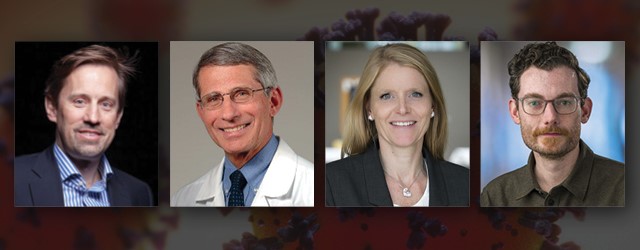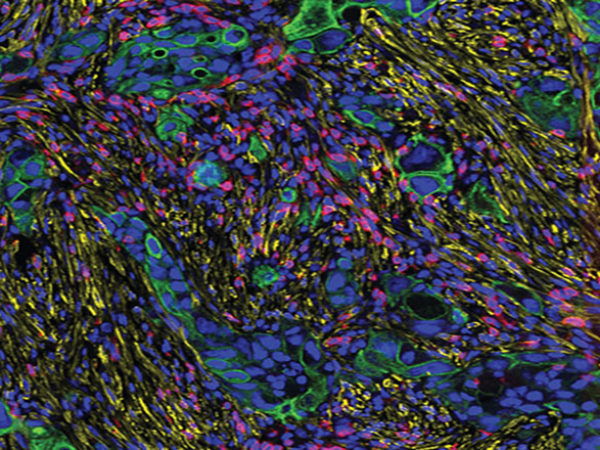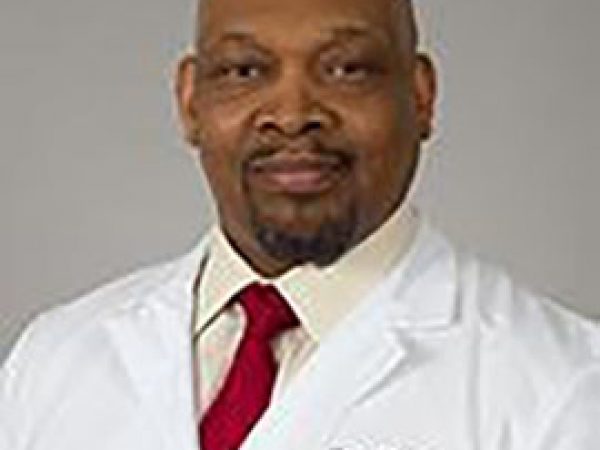“We Have to Be Involved” – A Preview of the AACR Virtual Meeting on COVID-19 and Cancer
The COVID-19 pandemic continues to impact the United States and other parts of the world. To date, 13 million cases have been reported worldwide with approximately 579,000 deaths. Although much of the world’s attention has focused on COVID-19, cancer remains a major health problem, now further complicated by the many unknowns of the pandemic.
The American Association for Cancer Research (AACR) Virtual Meeting: COVID-19 and Cancer, which will be held July 20-22, will bring together researchers, physicians, and other experts to discuss the pandemic and its impact on cancer. Registration is now open.
We spoke with program committee chair and AACR President-Elect David Tuveson, MD, PhD, FAACR, about the upcoming meeting, the effect of the pandemic on cancer care and outcomes, and how cancer research has contributed to the efforts against COVID-19.
What was the motivation behind the upcoming COVID-19 and Cancer Virtual Meeting?

The AACR Virtual Meeting: COVID-19 and Cancer was motivated by our realization several months ago that COVID-19 was going to be an extremely serious health concern across the United States and the world. We were particularly worried about cancer patients because they are vulnerable to additional illnesses while undergoing treatment due to attenuation of the immune response. We were also concerned that if the virus was as bad as people thought it would be, then cancer patients wouldn’t be able to access the care they needed.
Throughout its 113 years of existence, the AACR has helped advance cancer research and educate people about cancer. It became apparent early on during the COVID-19 pandemic that the AACR needed to be involved in addressing the pandemic, too. To do this, we need experts in developing new treatments and diagnostic methods and conducting clinical trials. The AACR has been working in these areas for many years in the context of cancer. We thought that our experience in this realm could help in addressing COVID-19 as well. We reached out to leading scientists and doctors, the National Cancer Institute (NCI), the National Institutes of Health (NIH), the Food and Drug Administration (FDA), and our other connections in Washington, D.C. They were thinking the same thing: The experience and expertise from cancer researchers and cancer doctors could help in this pandemic.
One of the AACR’s approaches to advancing cancer research has been to host meetings to bring together experts in the field to share the latest research, exchange ideas, and develop collaborations. Therefore, the decision was made to host a virtual international meeting to discuss COVID-19, its impact on society, and importantly, its impact on cancer patients. The objectives of the upcoming meeting are to assess what is known about this pandemic several months into it, to discuss what physicians have learned from taking care of patients, and to present new ideas for treating and diagnosing the disease.
The AACR is invested in addressing the pandemic. We have to be involved. The COVID-19 pandemic has shaken the world at its foundation and has stopped many segments of society as the surge occurs. I hope this meeting provides an information-rich moment so that everybody who is affected by the pandemic can learn from it.
How has the COVID-19 pandemic impacted cancer clinical trials and other facets of cancer research and cancer care? What are the potential long-term effects of the pandemic on cancer incidence and mortality?
When the pandemic hit, clinical trials were put on hold except for those deemed essential for the well-being of patients. New clinical trials that had not yet opened were paused at most sites. This was because the infrastructure needed to direct clinical trials, such as medical staff and data safety monitors, was not available. Now that the pandemic has been mitigated in certain parts of the country, clinical trials are reopening at many sites. However, there is concern that as the pandemic surges in other parts of the country, like in the South, clinical trials will be put on hold again due to a scarcity of medical staff available to run them.
This situation has presented a challenge—and an opportunity—to redesign clinical trials in such a way that we don’t need the human resources that have traditionally been required. One thing that has come out of this is the rise of telemedicine, which has helped in routine medical care of cancer patients and which is also becoming increasingly accepted for use in clinical trials. The FDA and other regulatory agencies have been terrific partners in enabling doctors at academic sites to use telemedicine in clinical trials, which in the past was not a component.
During the pandemic, the FDA has also become innovative about how it approves new drugs. Since the FDA is now also reviewing therapies for COVID-19, there may be some impact on cancer drug approvals.
As far as the potential long-term effects of the pandemic, one thing we have observed is that the pandemic has already led to a decrease in the diagnosis of major cancers across the United States, but we believe this is a false decrease that is due to fewer people being screened for cancers such as breast or colorectal cancer. The impact of fewer screenings has been modeled by individuals at the NIH, and they hypothesize that we will see an upswing in cancer mortality because we may be losing the ability to intercept cancer early. If we continue to delay screening, we are going to unwittingly contribute to increased mortality for those cancers where screening saves lives.
How might having cancer impact a patient’s susceptibility to SARS-CoV-2 infection and the severity of the resulting disease? Conversely, how might having COVID-19 affect the outlook of patients with cancer?
Data from multiple countries, including the United States, show that overall, patients with cancer have not done much worse from COVID-19 than the general population. However, patients who have extremely advanced cancer in addition to COVID-19 do appear to be more vulnerable than individuals with COVID-19 who do not have cancer. Additionally, it has been observed that patients with certain blood cancers have more severe COVID-19 outcomes.
Something we don’t know yet is how having COVID-19 may impact a later diagnosis with cancer. We have observed that SARS-CoV-2, the virus that causes COVID-19, can spread through the body and wreak havoc across multiple tissues and organ systems. Will patients who recover from COVID-19 be more susceptible to cancer? We just don’t know right now, but we are worried about long-term events.
Interestingly, it also appears that certain patients with COVID-19 who have cancer have better outcomes than those without cancer, which may be linked to the therapies they receive. Certain cancer therapies can attenuate inflammation and therefore may help treat COVID-19 as well. This was an important observation made by cancer doctors, and these therapies are now being tested in patients with COVID-19 who do not have cancer.
The meeting includes sessions that focus on using cancer drugs to treat patients with COVID-19. Which types of cancer drugs have been used to treat patients with COVID-19? What is the rationale for using these to treat this disease?
It became clear early on that some patients with COVID-19 had a severe inflammatory reaction. It turned out that the cancer community had noticed this exact reaction—called cytokine release syndrome—when cancer patients were given chimeric antigen receptor T-cell (CAR-T) therapy. CAR-T pioneers Carl June, MD, and Crystal Mackall, MD, had developed methods to treat patients with this syndrome by using IL-6 receptor antibodies. Physicians in China used IL-6 receptor antibodies to treat patients with COVID-19 and reported improvements in the patients. This approach has now been tested in many countries, and it does appear that certain patients who have cytokine release syndrome improve when treated with methods that decrease the severity of these symptoms.
Other cancer drugs that could be used to treat COVID-19 are Bruton’s tyrosine kinase (BTK) inhibitors, which have been used to treat various forms of lymphoma and leukemia. Louis Staudt, MD, PhD, and his colleagues observed that patients with blood cancers who were taking BTK inhibitors had a lower incidence of COVID-19, and those who did develop COVID-19 improved quickly. BTK inhibitors are currently being evaluated in randomized trials as an intervention for people with COVID-19.
Researchers are now searching for other drugs in the cancer space that could be used to treat COVID-19. Keith Flaherty, MD, who is an expert on cancer drug development, will lead a session on this topic at the upcoming meeting. Of course, there is also interest in developing drugs that target essential proteins of the virus itself, and we are encouraging cancer researchers with expertise in drug discovery and development to pursue such leads. This will be discussed at the meeting as well.
How has cancer research informed research on SARS-CoV-2 vaccines? What are some of latest topics in vaccine development that will be discussed at the meeting?
Cancer research has played a big role in vaccine development. The infrastructure for going from basic research to vaccine development exists at the NIH, and particularly at the NCI. In fact, the NIH was one of the leading sites during the development of the human papillomavirus vaccine by Doug Lowy, MD, and his colleagues. Dr. Lowy and colleagues are now applying their talents to develop vaccines against SARS-CoV-2 in partnership with other scientists at the NIH, in academia, and in industry.
Dr. Lowy is one of the plenary speakers at the meeting, during which he will discuss the status of vaccine development from the NIH. We also have a forum scheduled at the meeting, where AACR President Antoni Ribas, MD, PhD, FAACR, will be speaking with some of the industry scientists who partnered with the NIH to develop and evaluate vaccines. Finally, Anthony Fauci, MD, who has become the spokesperson of the COVID-19 pandemic in the United States, will give the opening keynote, during which he will likely address the status of vaccine development.
We are all hopeful that there will be a vaccine available, but it is important to understand that making a vaccine for some viruses is easier said than done. Recent data suggest that the antibody titers could drop over just a few months in patients who have recovered from COVID-19. If this is the case, then protection from a vaccine may not be long-lasting, but we do not know yet. It may be that we will need a combination of vaccines and medicine to address the pandemic. Researchers are working on both sides of the table: vaccines and new medicines. At this time, there are many unknowns, but we will discuss the latest updates at the conference.
COVID-19 has disproportionately affected minority populations in the United States. What are some of the contributing factors for these disparities? How will these disparities be addressed during the meeting?
Like disparities seen in cancer, the racial disparities of COVID-19 are likely influenced by both genetics and environment. Genetic linkage studies have been conducted for individuals in Italy and Spain who developed COVID-19 and those who did not, independently of race. These studies identified two genetic loci that could increase the risk for COVID-19: one involved a gene cluster that includes genes involved in inflammation, while the other involves the ABO blood group antigens. While detailed work has not yet been conducted across ethnicities, it is possible that certain racial/ethnic groups may harbor such genetic features that increase the risk of COVID-19, as is true for certain cancers.
There is no question that lower socioeconomic status and lack of health care also have roles, and these are known to be more common within certain minority groups. If someone does not have access to quality health care, they are much more likely to have health problems. Oftentimes, individuals of a low socioeconomic status live in close quarters, which we know increases transmission of the virus. There is also the fact that a large proportion of essential workers, at least in the New York area, are Black or Hispanic.
We will have two symposia on the topic of race and COVID-19. One session will examine non-social etiologic factors, such as mechanistic causes of disease that could be related to genetics and race. The other session will discuss social inequities and their impact on this disease. We will also have a forum, moderated by John Carpten, PhD, chair of the AACR Minorities in Cancer Research Council. The forum will discuss multiple issues on race, inequality, and disease. The social justice movement that is occurring in parallel to the COVID-19 pandemic has highlighted how racism itself could play a role in the COVID-19 pandemic. There is more we need to learn about this topic and more we need to respond to as a community. We’re going to examine ethnicity, racism, and COVID-19 both scientifically and humanistically, and have a conversation such that we can begin to chart a forward strategy to address this issue as an organization.




